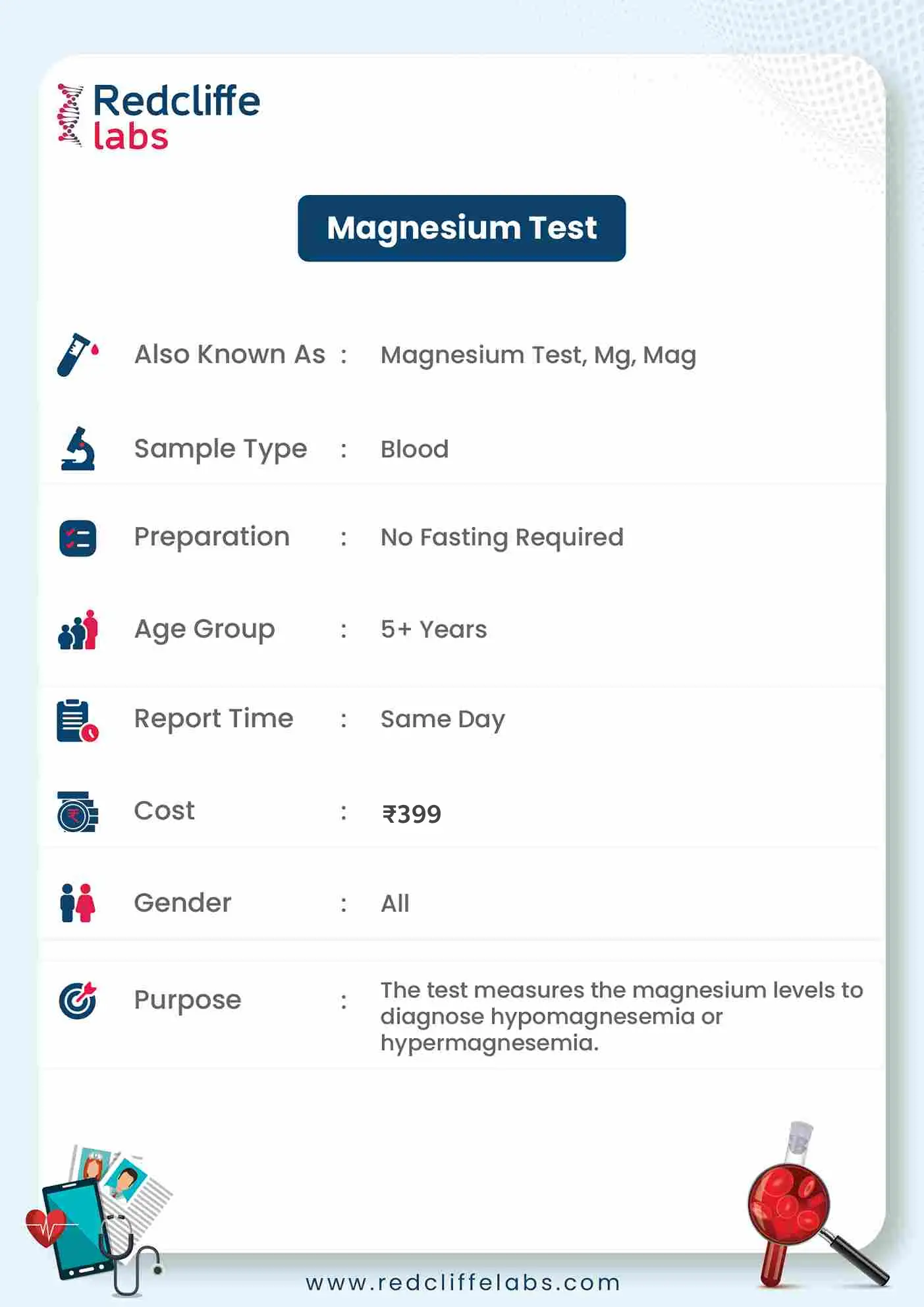The Magnesium Test measures blood magnesium levels, ...Read more
Blood
Unlock special
discount on
this package
Login to Unlock 🔓
Also Known As
Mg testNABL Accredited lab*

Booking Benefits Unlocked Worth FREE 799

Report Consultation

Diet Plan
*Available once your report is generated.
At Redcliffe Labs, we have a single goal: to give India its right to quality diagnostics.
Customers served
Tests Processed Everyday
Cities
Collection Centres
World Class In-house Labs
Home Collection Experts
1 Test Parameters
Magnesium
1 PARAMETER INCLUDED
1 PARAMETER INCLUDED
- Magnesium
Top Booked Health Checkup Packages
Reports in 12 hours
|Parameters 94
Reports in 12 hours
|Parameters 89
Reports in 12 hours
|Parameters 96
Reports in 12 hours
|Parameters 96
Reports in 12 hours
|Parameters 90
Helps you know your test better
Q. What is a Magnesium Test?
Q. What are the special preparations necessary for the test?
Q. What are there any risks associated with the test?
Q. What is the cost of the Magnesium test ?
Verified by Medical Expert

WRITTEN BY
Sheena Mehta

MEDICALLY REVIEWED BY
Dr. Pradeep Lodha
Table of Content
Introduction to Magnesium Test
The magnesium test is a blood test that measures the level of magnesium in your blood. This essential mineral plays a crucial role in muscle and nerve function, energy production, bone health, blood sugar control, blood pressure regulation, mood, and brain function. Your doctor may recommend the magnesium test to identify magnesium deficiency (hypomagnesemia), which is more common, and hypermagnesemia (too much magnesium), which is less severe but frequent. The symptoms of magnesium deficiency may cause muscle cramps, weakness, fatigue, irregular heartbeat, numbness, or seizures. The deficiency may also cause diabetes, kidney disease, or digestive disorders. To identify your magnesium levels, get a Magnesium lab test from Redcliffe Labs. Book your home sample collection, and the phlebotomist will come to your place to collect your sample. Trust us as your diagnostic partner, and we ensure you provide the best and hassle-free diagnostic experience.
Test details in brief
| Also Known As | Magnesium Test, Mg, Mag |
| Purpose | The test measures the magnesium levels to diagnose hypomagnesemia or hypermagnesemia. |
| Preparation | Do not take any over-the-counter medicine without confirming with your Doctor. |
| Fasting | No Fasting Required |
| Get Reports | Within 12 hrs |
| Cost | INR ₹399 |

Purpose of the Magnesium test
The purpose of a magnesium test is to measure the magnesium level in your blood. Here is the purpose-
- Detect magnesium imbalances-
- Magnesium deficiency (hypomagnesemia)- This is more common and can cause symptoms like muscle cramps, fatigue, irregular heartbeat, and even seizures.
- Magnesium excess (hypermagnesemia)- This is less common in people and can be dangerous as it affects nerve and muscle function, causing weakness, slowed breathing, and even coma.
- Diagnose underlying conditions- Magnesium levels can reflect various health concerns. Low levels might indicate kidney problems, digestive disorders, or excessive alcohol intake. High levels could point towards kidney failure, certain medications, or other issues.
- Monitor treatment effectiveness- Low magnesium levels persistently can cause low calcium and potassium levels. The test tracks the magnesium levels in the body and helps doctors to adjust the treatment plans as needed.
- Assess potential risks- In certain cases, like pregnancy or pre-existing conditions, doctors recommend magnesium tests to prevent potential complications.
What does the Magnesium test measure?
The magnesium test measures the amount of magnesium present in your blood. The test measures the
Magnesium in the blood is less than 1% of the total magnesium stored in the body. Since most magnesium is stored in bones and cells, the test indirectly reflects the overall magnesium status, but to a limited extent. Magnesium deficiencies (hypomagnesemia) may be caused due to malnutrition conditions and excess mineral absorption by kidneys. However, excess magnesium production (hypermagnesemia) may happen with ingesting antacids containing magnesium and with a decreased ability of the kidneys to excrete the mineral.
Preparation for the Magnesium test
The magnesium test is a simple blood test with no or minimal preparation. Here is what you need to know-
- Fasting- No fasting is required before the test.
- Inform your doctor- If you take any medicines or supplements, inform your doctor, as they might affect your magnesium levels.
If you have any concerns or questions about the test, don't hesitate to ask your doctor or healthcare provider.
The procedure of the Magnesium test
During the magnesium test, the phlebotomist will collect blood samples from the vein of your arm. The lab expert will tie a band around your upper arm to make the veins swell with blood, making it easier to draw. After that, he will clean the arm area with an antiseptic solution. Then, he will insert a needle into a vein and collect the sample. You might feel a slight pinch or prickling sensation during the procedure, but this will get normal in a few minutes. After sample collection, the phlebotomist will remove the needle and put a bandage over the puncture site to stop bleeding. You can resume your normal activities immediately after the test. The Magnesium test results will be available within 12 hours of sample collection. The entire procedure will only take a few minutes.
Why do you need a magnesium test?
A magnesium test is essential for several reasons. Here are the key reasons why you might need a magnesium test-
- Your doctor might recommend the test to detect abnormal magnesium levels, which may cause various health issues. Low magnesium levels might be due to gastrointestinal disorders.
- People with chronic conditions such as diabetes or chronic kidney disease or those who consume excessive alcohol may require regular magnesium testing.
- If you experience symptoms such as muscle weakness, cramps, irregular heartbeat, nausea, or fatigue, you must take a magnesium test to check your magnesium levels.
- The test can help evaluate your nutritional status if you follow a restrictive diet that might lack sufficient magnesium.
What do the Magnesium test reports indicate?
The magnesium test reports will be available within 12 hours of sample collection. You can access your test results online from the Redcliffe Labs app or website. The magnesium test reports will show normal range, low, and high magnesium levels.
- Normal magnesium level (hypomagnesemia)- The Magnesium test normal range is 1.7 to 2.2 mg/dL (0.85 to 1.10 mmol/L).
- Low magnesium levels (hypermagnesemia)- Low levels indicate that you are not consuming enough magnesium and have a magnesium deficiency. This can lead to symptoms like muscle cramps, fatigue, weakness, irregular heartbeat, and even seizures. People having digestive disorders, Hypoparathyroidism, diabetes, diarrhea, kidney problems, and Chronic glomerulonephritis have low magnesium levels.
- High magnesium levels- The condition is seen rarely but has been seen in people with end-stage renal disease (ESRD), Hyperparathyroidism, Hypothyroidism, Tissue trauma, Dehydration, and Addison’s disease. This can cause muscle weakness, slowed breathing, and even coma.
Consult your test reports with your doctor based on your medical history, age, gender, and magnesium levels; the doctor will advise you on the best treatment.
Who should take the Magnesium test?
While anyone can take the magnesium lab test, some people are at high risk of magnesium deficiency or excess and must take this test. Here are some of the situations-
- People experiencing symptoms like muscle cramps, weakness, fatigue, low energy, irregular heartbeat or arrhythmias, and high blood pressure must take the test.
- People with medical conditions like chronic kidney disease, diabetes, digestive disorders, alcoholism, malnutrition, or eating disorders are prone to abnormal magnesium levels.
- Pregnant women are recommended to take the magnesium blood test to ensure optimal health for both mother and baby.
- People at risk of osteoporosis must take the test to assess the risk of bone loss.
- Your doctor may also recommend the test as a part of routine checkups for people with risk factors or concerns.
What are the common symptoms related to abnormal Magnesium levels?
Symptoms of low magnesium include:
- Loss of appetite
- Nausea and vomiting
- Fatigue and weakness
- Muscle cramps
- Numbness and/or tingling
- Irregular heartbeat (arrhythmia)
- Seizures (if magnesium levels are extremely low)
Symptoms of High Magnesium
- Diarrhea
- Abdominal cramping
- Cardiac arrest (in case of high levels of magnesium)
Your doctor may recommend the magnesium test to monitor your health if you have abnormal magnesium levels-
- Take medicine that can reduce magnesium levels, for example:
- Diuretics ("water pills") and Proton pump inhibitors to reduce stomach acid Take medicine in case you want to increase magnesium levels, for example, Aspirin
- Chronic kidney disease
- Diabetes that's not well controlled
- Alcohol use disorder
- Malabsorption syndrome
- Lithium
- Malnutrition
- Chronic (long-lasting) diarrhea
- Low levels of potassium and/or calcium
- Certain medications and laxatives for constipation and some antacids for heartburn or gastroesophageal reflux disease (GERD)
- Get in treatment for magnesium and/or calcium.
Low Magnesium Levels (Hypomagnesemia)
Causes of Low Magnesium Levels:
- Inadequate Dietary Intake- Low consumption of magnesium-rich foods like seeds, nuts, leafy greens, and whole grains.
- Excessive Loss Through Urine or Stool- Chronic diarrhea or malabsorption disorders like Crohn’s disease or celiac disease. Kidney disorders may cause excessive excretion.
- Chronic Alcoholism- Alcohol can disrupt magnesium absorption and increase its loss through urine.
- Certain Medications- Long-term use of diuretics, proton pump inhibitors (PPIs), or antibiotics can lead to magnesium depletion.
- Uncontrolled Diabetes- High blood sugar can cause excessive loss of magnesium through urine.
- Stress- Chronic stress depletes magnesium stores in the body.
- Hormonal Changes- Pregnancy or lactation can also increase magnesium demand, leading to deficiency if not supplemented.
High Magnesium Levels (Hypermagnesemia)
Causes of High Magnesium Levels
- Kidney Dysfunction or Failure- Impaired kidneys cannot excrete magnesium effectively, leading to accumulation.
- Excessive Magnesium Intake- Overuse of magnesium-containing laxatives, antacids, or supplements.
- Adrenal Insufficiency- Conditions like Addison's disease can increase magnesium levels due to hormonal imbalances.
- Hypothyroidism- Reduced thyroid function can impact magnesium regulation, leading to higher levels.
- Medications- Certain medicines like lithium or certain diuretics can increase magnesium retention.
- Dehydration- Severe dehydration can increase magnesium levels in the blood.
Both low and high magnesium levels can lead to serious complications if left untreated. Therefore, it is important to consult your doctor for proper evaluation and management.
What are the risks associated with Magnesium tests?
The Magnesium lab test is a blood test, and the process is safe, with minimal risks of discomfort or complications. Here are some potential risks-
- Fainting
- Dizziness and lightheadedness
- Infection
- Inflammation
- Bleeding
- Bruising
Magnesium Test price at Redcliffe Labs
The magnesium test cost at Redcliffe Labs is INR 399. You can book your magnesium lab test using the Redcliffe Labs app or online from our website. The test booking process is simple and hassle-free, and you can book your test in just 1 minute. You can also call us, our service provider, to book your test. Choose us as your trusted diagnostic partner and get affordable diagnostic services. Our labs are NABL-accredited and ISO-certified, so you do not need to worry about the quality of test results. With our on-time services, the phlebotomist will reach the doorstep on time for sample collection.

Magnesium Test Cost in Different Cities
| City Name | Discounted Price |
| Delhi | ₹399 |
| Noida | ₹399 |
| Mumbai | ₹399 |
| Bangalore | ₹349 |
| Kolkata | ₹399 |
| Pune | ₹399 |
| Lucknow | ₹399 |
| Ahmedabad | ₹399 |
| Hyderabad | ₹399 |
| Chennai | ₹399 |
| Gurgaon | ₹399 |
| Jaipur | ₹399 |
| Faridabad | ₹399 |
| Indore | ₹399 |
| Patna | ₹399 |
Note: We also offer Sodium blood test in other different cities in PAN India. Please call on 8988988787 to check the availability of services in your area.
Ensuring Balance: The Importance of Monitoring Magnesium Levels
Magnesium imbalances, both deficiency and excess, can lead to various health concerns, including muscle cramps, fatigue, irregular heartbeat, and even seizures. Therefore, it is crucial to take control of your magnesium levels and prevent complications by taking regular magnesium tests. This test can aid in diagnosing underlying conditions like kidney disease, digestive disorders, or diabetes. It also helps monitor the effectiveness of treatment for deficiency or excess, ensuring optimal management. For people with certain health conditions, pregnancy, or risk factors for osteoporosis, regular monitoring of magnesium levels can help to identify potential issues and prevent complications. By understanding the importance of magnesium and the potential benefits of testing, you can make informed decisions about your health and maintain optimal magnesium levels for a healthy and vibrant life—Trust Redcliffe Labs to take the Magnesium test. We ensure that we provide the best and most affordable diagnostic services right from your home.
5 Simple Steps to Manage Your Health with Redcliffe Labs
Quick, Simple & Convenient; trusted care delivered to your doorstep.

Start Your Online Booking
Open the Redcliffe Labs website/app. Select the test or package and enter your details. Schedule the service for your preferred slot.

Live Tracking
Stay updated with real-time tracking for a smooth and timely home sample collection.

Sample Collection
Our certified experts ensure a smooth, hygienic, and fully compliant sample collection experience.

Doctor-Verified Smart Reports
Every report is clinically checked by expert doctors and shared with smart, actionable insights.

Your Health Journey Continues Post Reports
Consult with our expert medical team to get actionable insights to improve your health.
Nearby Labs(9)
Redcliffe Labs Noida

MC-5280
Redcliffe Collection Center
Redcliffe Collection Center
Redcliffe Collection Center
Redcliffe Collection Center
Redcliffe Collection Center
Redcliffe Collection Center
Redcliffe Collection Center
Redcliffe Collection Center
Frequently Asked Questions
What is the most accurate test for magnesium deficiency?
What is the difference between magnesium and magnesium RBC blood tests?
What is a good magnesium level for a woman?
What happens if magnesium is high?
How low is too low for magnesium?
What is a safe magnesium level in blood?
Why do I need a magnesium blood test?
What happens during a magnesium blood test?
What is a Magnesium test?
What is the price of a magnesium test?
Can I book a Magnesium Test near me?
Can I book a home collection for a Magnesium Test?
Health Articles & Blogs
My Health
Stay informed with our expert health articles and blogs. Explore comprehensive guides on diseases, nutrition, preventive care, and wellness tips to help you make better health decisions.
টাইফয়েড কি বাহিত রোগ? – জানুন সবকিছু

What to Drink to Lose Belly Fat in 1 Week

Can Exercise Really Treat Depression? What Research Says
Discover what research says about exercise and depression. Learn how physical activity may improve mood, reduce symptoms, and support mental health.

Is It Good to Eat Dried Cranberries Every Day? Benefits & Risks
Discover the health benefits and potential risks of eating dried cranberries every day, including sugar levels and portion tips.

7 Health Screenings Every Woman Above 30 Should Get Done Annually

Fat vs Muscle: Are they Different?

Can Managing High Blood Pressure Lower Uterine Fibroid Risk?

Debunking Epilepsy Myths: What Everyone Should Know
Explore My Health
